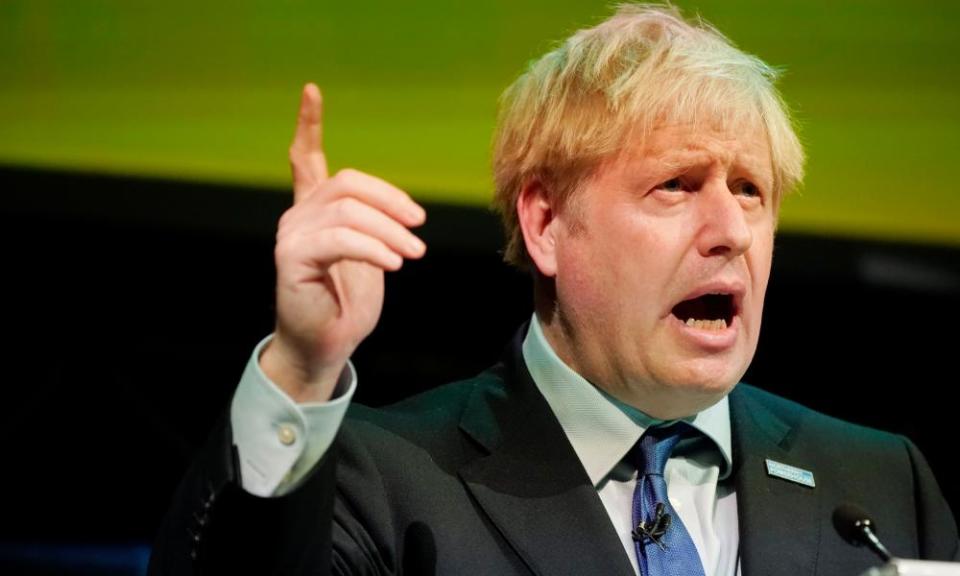EU officials reject Boris Johnson claim of 'huge progress' in Brexit talks

EU officials have rejected Boris Johnson’s claim that “a huge amount of progress” is being made in Brexit talks, as Jean-Claude Juncker warned that time is running out.
Juncker, who will stand down as European commission president on 31 October, is expected to ask Johnson to spell out his ideas for replacing the Irish backstop when the pair meet over lunch in Luxembourg on Monday.
Johnson told the Mail on Sunday there were “real signs of movement” in Berlin, Paris and Dublin on getting rid of the backstop, the persistent stumbling block to a Brexit agreement. “A huge amount of progress is being made,” he said.
But EU officials involved in talks with Johnson’s envoy, David Frost, have dismissed his upbeat account.
“No, in fact people are a bit dismayed,” said one EU source, describing the mood after the latest talks. “I am not even going to call them negotiations – the last session on Friday did start touching on content – that’s actually quite a step forward … but we still should have been there a long time ago and [an end result] is still quite far away.”
The lunch meeting with Juncker comes 26 days after Johnson met Angela Merkel in Berlin and declared he had 30 days to persuade the EU there was a viable alternative to the backstop.
That meeting in Berlin, followed by others with EU leaders in Paris and Biarritz, raised hopes that the prime minister was serious about a deal. But optimism in Brussels rapidly dissipated, after Johnson prorogued parliament and stepped up his no-deal rhetoric, while failing to put any proposals on paper.
A spate of recent reports from London analysts that a deal was becoming more likely were dismissed as “completely wrong” by one senior EU official.
Johnson’s latest rhetorical fancy – that, like the Incredible Hulk, the UK would break out of its “manacles” on 31 October – has further fuelled EU scepticism about his sincerity.
Describing the language as “not very surprising”, the EU source said: “It all makes it look like it’s a bit of a joke. We are talking about something extremely serious. The consequences of no deal will be extremely serious and it looks like this is being treated as a game in which you are the hero sort of story rather than [dealing] with real lives.”
Juncker said a no-deal Brexit would be a mess and take years to resolve. Speaking to Deutschlandfunk, he said patriots in the UK “would not wish your country such a fate”.
He said the EU knew what the British did not want, but were still waiting for alternative backstop proposals: “I hope we can get them, but time is running out.”
EU officials hope the meeting will create momentum towards an agreement. The outgoing commission president is not involved in day-to-day Brexit talks, but has intervened at crisis points. In March, for example, he tried to help Theresa May sell the deal to Conservative backbenchers, with pledges that the EU did not want to trap the UK in the backstop.
The backstop, a fallback plan for avoiding a hard border on the island of Ireland, continues to keep both sides at loggerheads. Johnson is adamant the backstop must go, while the EU insists any exit agreement must contain the backstop or a legally watertight equivalent.
In Friday’s talks, Frost outlined ideas for an all-Ireland regulatory regime for food and agriculture, which Downing Street thinks would go a long way to replacing the backstop.
Brussels thinks these ideas fall far short of what is required to protect European markets from dangerous goods, fraud or unfair competition. EU officials say food safety, animal, plant and health measures cannot be separated from customs, because otherwise no one would know what is entering European markets.
Officials say the UK has put forward unfinished ideas on sanitary and phytosanitary (SPS) measures, which leave many questions unanswered, such as definitions of SPS goods and the scope of SPS regulations.
“As the UK starts exploring the question and starts to put ideas forward, they are starting to realise how complex SPS is,” the source said.
However, officials see some positive steps: they think the UK has agreed to “dynamic alignment” on food and agriculture, meaning Northern Ireland would automatically accept updates to the EU rulebook in these areas.
With time running short to resolve highly technical issues that touch on sensitive political questions, the EU is also uncertain whether Johnson can get a Commons majority for a deal.
The Johnson government has a “credibility problem” over whether it could get a revised agreement passed in the Commons, one EU diplomat said. “What kind of mandate does Mr Johnson have? Since he doesn’t have a majority and no party is really clear on [Brexit] then it would certainly be good to engage the opposition.”

 Yahoo News
Yahoo News 